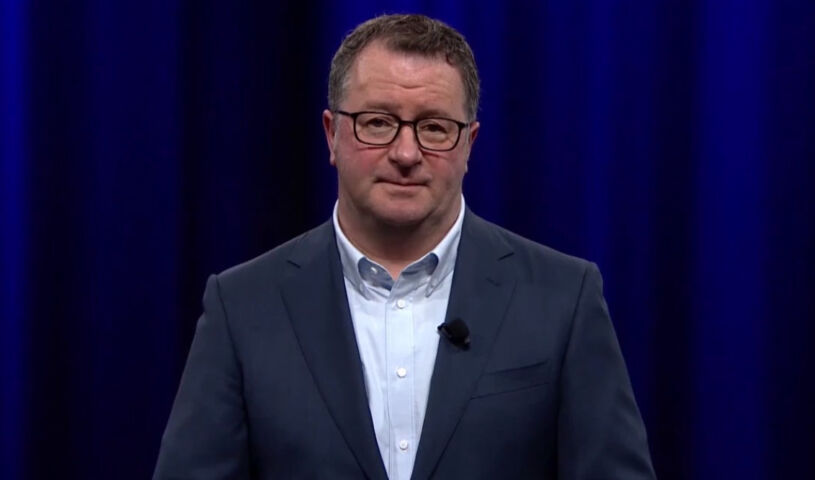AMO looks at challenging 2023, ahead to promising 2024
 Ontario municipalities faced many obstacles this past year. But Brian Rosborough saw positive progress for local governments in 2023. And he sees significant potential on the horizon for 2024. Photo: AMO Videos YouTube
Ontario municipalities faced many obstacles this past year. But Brian Rosborough saw positive progress for local governments in 2023. And he sees significant potential on the horizon for 2024. Photo: AMO Videos YouTube
Ontario municipalities faced many obstacles in 2023. The Greenbelt scandal dominated the headlines and led to changes that will directly impact local governments across the province. The ongoing COVID-19 recovery, fiscal shortfalls in areas such as health care and education, not to mention the ongoing battle against homelessness, all impacted municipalities
The challenges may have seemed insurmountable. But Brian Rosborough saw positive progress for local governments in 2023. And he sees significant potential on the horizon for 2024.
Rosborough is executive director of the Association of Municipalities of Ontario (AMO). He is quick to celebrate local government achievements during what he calls a “very challenging” year.
“Municipal councils, municipal senior public servants, are realists. They understand that things change … but they were very clear about what made sense and what didn’t make sense,” Rosborough said. “They were very honest about the potential impacts of some of the decisions. And they dealt with those decisions head on.”
Facing the Homelessness Crisis
There are 444 municipalities in Ontario. They represent everything from the country’s largest city to the smallest towns and villages. That said, they often find themselves dealing with the same problems – albeit on a different scale.
One of the things Rosborough said came to a head in 2023 was the homelessness crisis. And while homelessness had a major impact on urban areas, it was also an problem in rural, northern, and remote communities as well.
Homelessness was an issue that “really coalesced municipal point of view” because it was evident in communities large and small.
But one of the high notes of 2023 was the province finding $200 million a year in annualized funding to address homelessness. Not as much as what’s needed, Rosborough added, but an important contribution.
“This isn’t just an Ontario problem; it is a national problem. It’s a global problem, a systemic problem that relates to the kinds of decisions that we’ve been making in our economy for a very long time,” Rosborough said. “It’s a good example of what people, taxpayers, voters expect. That governments should work together to solve big problems.”
Push for a New Fiscal Model
AMO, along with their various provincial counterparts and the Federation of Canadian Municipalities, applied considerable pressure of the other orders of government to bring forward a new fiscal model for local governments.
Rosborough said he feels and the conversation around this new fiscal model “illuminated” the importance of this topic. The current fiscal framework for municipalities “simply doesn’t work,” Rosborough said.
But he was quick to add there is a bright spot on the horizon. Back in November, the province agreed to provide the City of Toronto with up to $1.2 billion in provincial operating supports over three years. That deal brought with it a promise by the province to take a broader look at the wider municipal fiscal framework by 2025.
Rosborough said he believes the Ontario government “has turned the corner.” He is hopeful about Queen’s Park’s renewed pledge to work with, and listen to, municipalities. He expects this will lead to an opportunity to sit down with the province and figure out what’s the best way for municipalities to finance services and infrastructure in a way that can underwrite the social and economic prosperity of the province.
Lauding Ontario’s Flexibility
His reason for optimism stems from way the province reversed course on several controversial decisions, including the Greenbelt. That course correction, he added, stemmed from organizations like AMO keeping the pressure on the province.
Rosborough said there were certain decisions made by the province that “did not reflect collaboration with municipalities.” In fact, they often kept municipalities out of important conversations around housing.
Municipalities, Rosborough said, saw that change in 2023.
“It’s fair to say that the democratic institutions here in Ontario did their job of making the government account for decisions that weren’t working for anybody really,” he said. “The kind of walking back of decisions that we saw in 2023 may be unprecedented. But I have to give the government credit for doing it. We all benefit when governments are held to account.”
AMO Excitement in 2023
Rosborough also saw positives much closer to home in 2023 – within AMO itself. One highlight that came to mind, the 2023 AMO conference in London. Rosborough lauded the City of London for the job it did hosting the conference. The 2023 event marked the second in-person conference since the two previous virtual gatherings held during the height of the COVID-19 pandemic.
The enthusiasm and interest displayed by the delegates was all the more encouraging, Rosborough said, given the turnover in attendees. This turnover came as a result of the 2022 municipal elections.
That election saw a 40 per cent turnover in elected councils. Rosborough said that change was reflected in the enthusiasm of conference attendees.
“Seeing new faces and recognizing that new councillors are as eager to become part of the collective conversation of the sector is really encouraging,” Rosborough said. “The unity and collaboration and cohesion of that sector is the real currency of government relations. Seeing people come together in that way was a highlight.”
Looking Ahead to 2024
As busy as 2023 was for AMO, and municipalities across the province, 2024 isn’t likely to be any easier to navigate.
Rosborough credits Ontario for having “taken a turn in the right direction.” He is quick to add AMO is eager to work with the province in helping them achieve their goals of 1.5 million new houses by 2031. That goal is one he describes as “a very ambitious target.”
He is also eager to push forward with what AMO is calling a social and economic prosperity review. The goal of this review is for municipalities and the province to sit down and discuss the “really out of date fiscal arrangements” that were last updated in 2008.
The review will play a feature of AMO’s pre-budget submission.
Last year, AMO launched two major new initiatives – the Healthy Democracy Project and Municipal Workforce Development Project. Rosborough said AMO will continue to focus on these efforts in 2024.
Closer to home, 2024 is also AMO’s 125th anniversary. With that in mind, the theme of the 2024 AMO conference, which will be in Ottawa, is going to be around celebration. It won’t only be an AMO celebration. It will also focus on the work that municipal councils and public servants are doing every day.
“We’re going to continue to advance good public policy, good fiscal policy. We’re going to do that in partnership with those that are like-minded,” Rosborough said. “Whether that’s agencies in the social services field, our Indigenous partners, our economic partners like boards of trade and others, we’re going to be working to build coalitions that help us … build toward a prosperous future.” MW
✯ Municipal World Executive and Essentials Plus Members: You might also be interested in Meyer’s article: Celebrating innovative public service in Ontario municipalities.
Sean Meyer is Digital Content Editor for Municipal World.
Related resource materials:



